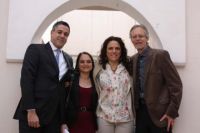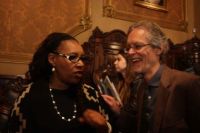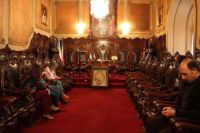_c8aa542f2787f483056967fc60e98f70.jpg)
Verne Harris receives the award from the University Rector
On 10 October, at a ceremony in Cordoba, the Foundation’s Director of Research and Archive Verne Harris received an honorary doctorate from Argentina’s oldest tertiary institution, the University of Cordoba.
Amongst previous recipients of the award is the current President of Bolivia Evo Morales. The award was in recognition of Harris’ contribution to archival theory, his activism, and his professional memory work in South Africa and internationally.
In his acceptance speech, Harris dedicated the honour “to my organisation, the Nelson Mandela Foundation, and to the many South Africans who do memory work with far more courage than me.”
Foundation Chief Executive Sello Hatang says: “We would like to congratulate Mr Harris on this great achievement. We hope that the recognition will encourage many memory professionals to keep working hard for social justice in their countries.”
In attendance at the ceremony was the South African Ambassador to Argentina Princess Zenani Dlamini, daughter of Nelson Mandela.

Verne Harris with Judge Daniel Rafecas, Dr Mariana Tello Weiss and Ms Maria Cristina
Read Harris' full speech below:
I am very humbled by this honour. My gratitude to the Rector of the University of Cordoba and to all the University structures which have made this possible.
Muchas gracias. My personal work is small. I dedicate this honour to my organisation, the Nelson Mandela Foundation, and to the many South Africans who do memory work with far more courage than me.
It is very special to be receiving it in the presence of the South African Ambassador, who I have been privileged to know for the last ten years.
Zenani, I believe you are doing Madiba proud. And it is special to have here with me today my three Argentinean compañeros Mariana Tello Weiss, Maria Cristina and Daniel Rafecas. Two people not here who have made my work possible are my wife Kerry and son Benjamin – I share the university’s honour with them.
Twenty years ago Nelson Mandela said:
“The truth is that we are not yet free; we have merely achieved the freedom to be free, the right not to be oppressed. We have not taken the final step of our journey, but the first step on a longer and even more difficult road … The true test of our devotion to freedom is just beginning.”
By the end of the apartheid era my country was profoundly damaged. We knew it would take generations to fix. But we were seduced into thinking we could fix things quickly. And, ironically, part of the seduction was the magic of Nelson Mandela.

Ambassador Zenani Dlamini congratulates Verne Harris
I was privileged to work for government when Nelson Mandela was President. Together with many of my friends and comrades, we really did believe we could fix anything. And for us only the best models and strategies in the world were good enough.
We looked to the north. We very seldom looked at the rest of Africa, Asia and South America. We thought we were exceptional.
Now we are starting to understand that we share problems and challenges with other developing countries, and we are beginning to try and learn from their experiences.
Now, nearly twenty years after the establishment of our own Truth and Reconciliation Commission (TRC), we are beginning to look at what we can learn from Argentina, from Chile and from Uruguay in relation to reckoning with our oppressive pasts.
Arguably we tried to reckon with our pasts too quickly. Some countries can wait. Even 20 years. We could not wait. It wasn’t only the levels of damage. We were sitting on a powder keg. 15 000 people had died between 1990 and 1994.
The 1994 election was almost stopped by white reactionaries working with black reactionaries. The levels of rage were high. The levels of expectation were high.
But did we choose a model that was designed to be a quick fix? Did we too easily try to close the book on the past? Did Nelson Mandela make it too easy for white South Africans to forget their role in a crime against humanity? Did we avoid the long, hard, painful work of prosecuting the perpetrators of human rights violations?
Of course, there is a long answer to these questions. And a very short answer - yes.
But the world misunderstands our reconciliation project if it looks only at our TRC. Nelson Mandela’s government adopted a wide-ranging strategy for reckoning with the past which had many elements and many instruments.
The TRC provided the basis for truth-recovery, reparation, conditional amnesty, and systematic prosecution.
Also put in place were the following:
A land restitution process
A land reform policy designed to transfer 30% of white-owned land to black farmers by 2014
Employment equity and affirmative action policies
A black economic empowerment strategy
Special pensions for those who contributed to the struggle against apartheid
A Missing Persons Unit
A Special Investigations Unit
And, crucially, the Reconstruction and Development Programme (RDP) designed to restructure the state and the economy in order to redistribute wealth and advance previously disadvantaged communities
Much of this work is ongoing. Much good work has been done.
However, overall our implementation of these strategies has been very slow. Most important, in some areas we have stopped the work.

Most of the TRC’s recommendations were ignored. Reparations were small. Only two prosecutions have taken place since the TRC finished its work in 2003. And, crucially, the RDP was replaced by a neo-liberal macro-economic policy.
Inequality in South Africa today is greater than it was in 1994.
“We have not taken the final step of our journey, but the first step on a longer and even more difficult road.”
There is a lot of rage in our society, rooted in the past. We are beginning to learn that we are paying a price for not implementing the vision of Nelson Mandela when he first became President. We know now that we have lots to learn. We have lessons to learn here in Argentina.
My work is small. Very modest. It is the work of memory. The work of reminding South Africa about our obligations to the thousands who died during the struggle for freedom, to the millions who suffered through colonialism and apartheid. But the vision for this work is big. It is the vision of a just society.
The vision of freedom Nelson Mandela had when he came out of prison.
A luta continua. I thank you. Muchas gracias.